Growing up, I had the privilege of sharing my life with a Boxer named Max. He was more than just a pet; he was a loyal companion, a playful friend, and a beloved member of our family. But as much as we loved him, we also experienced the challenges that come with raising such an energetic and intelligent breed.
That’s why we understand the importance of proper training for Boxers. It’s not just about teaching them basic commands or correcting behaviors; it’s about unlocking their full potential and nurturing the incredible bond that exists between a Boxer and their owner.
Whether you’re a new owner or have had Boxers in your life for years, this article is here to provide expert tips and tricks to help you navigate the world of Boxer training. From socialization to basic obedience, grooming to exercise, we’ve gathered valuable insights from various sources to ensure your Boxer is well-behaved, happy, and thriving.
Key Takeaways:
- Start socializing your Boxer from a young age to ensure they are comfortable around other dogs and people.
- Get your Boxer used to grooming tools and incorporate grooming into their training routine.
- Teach your Boxer basic obedience commands using positive reinforcement and engage them in training games.
- Establish a potty training routine and be patient and consistent throughout the process.
- Once your Boxer has mastered basic obedience, move on to teaching them advanced commands and tricks.
Socialize Your Boxer with Dogs and People
Socialization is crucial for Boxers to ensure they are comfortable and well-behaved around other dogs and people. By properly socializing your Boxer, you can prevent aggression and ensure they are friendly and confident in various social situations. Here are some tips and techniques to effectively socialize your Boxer:
- Start early: Begin socializing your Boxer from a young age, ideally between 3 and 14 weeks old. This is a critical period for social development, and exposing your Boxer to different people, dogs, and environments during this time will help them become more adaptable and sociable.
- Introduce gradually: Start by introducing your Boxer to friendly and well-behaved dogs in a controlled environment. Choose dogs that are calm and have good social skills. Allow them to interact, sniff, and explore each other while closely monitoring their behavior.
- Positive reinforcement: Use positive reinforcement techniques, such as treats and praise, to reward your Boxer for calm and friendly behavior during socialization sessions. This will help them associate positive experiences with social interactions and motivate them to behave appropriately.
- Attend training programs: Enroll your Boxer in training programs like the AKC Family Dog Program or local obedience classes. These programs provide structured socialization opportunities and teach your Boxer basic obedience skills at the same time.
- Expose to different environments: Take your Boxer to various places, such as parks, pet-friendly stores, and outdoor events, to expose them to different sights, sounds, and smells. This will broaden their experiences and make them more confident in new and unfamiliar settings.
- Consider vaccination schedule: While socializing your Boxer, it’s important to consider their vaccination schedule and avoid exposing them to unvaccinated or potentially sick dogs. Consult with your veterinarian to ensure your Boxer’s vaccinations are up to date before engaging in socialization activities.
With consistent socialization efforts, your Boxer will learn to be comfortable and well-behaved around other dogs and people. This will greatly contribute to their overall happiness and quality of life. Remember to always prioritize your Boxer’s safety and well-being during socialization activities.
Get Your Boxer Used to Grooming
While Boxers are known for their short hair, proper grooming is still essential to maintain their cleanliness and prevent drooling. Introducing your Boxer to grooming tools and techniques from a young age is key to ensuring their comfort and cooperation during grooming sessions.
To get your Boxer used to grooming, follow these tips:
- Start Early: Begin introducing grooming tools, such as brushes and washcloths, to your Boxer puppy as soon as possible. This will help them become familiar with the sensations and sounds associated with grooming.
- Positive Reinforcement: Use treats and praise to reinforce positive behaviors during the grooming process. This will create a positive association and make grooming a rewarding experience for your Boxer.
- Focus on Key Areas: Pay special attention to areas like the muzzle, paws, and hindquarters, as these are common areas that require grooming. Gradually desensitize your Boxer to being touched and handled in these areas.
- Prepare for Baths and Vet Exams: Grooming sessions are also an opportunity to prepare your Boxer for baths and visits to the vet. Get them comfortable with being touched, washed, and having their nails trimmed.
Incorporating grooming into your Boxer’s training routine not only helps maintain their hygiene but also strengthens the bond between you and your furry companion. The rewards of successful grooming sessions include a clean and well-groomed Boxer, as well as a sense of accomplishment as a responsible pet owner.
Teach Your Boxer Basic Obedience
Boxers are intelligent and energetic dogs, making it essential to provide them with basic obedience training. The sooner you start training your Boxer, the better. Begin with fundamental commands such as “Sit,” “Stay,” and “Come.” By establishing a foundation of obedience, you will build a strong bond with your Boxer and ensure they are well-behaved in various situations.
Consistency is key when training Boxers. Be clear and firm with your commands, using positive reinforcement to encourage good behavior. Boxers respond well to reward-based training methods, so keep plenty of treats on hand. Treats like small pieces of chicken or hot dogs are highly effective in motivating your Boxer during training sessions.
To maintain your Boxer’s enthusiasm and prevent boredom, keep training sessions engaging and interactive. Incorporate games and toys to make learning fun for both you and your furry companion. Remember, Boxers thrive on mental stimulation and enjoy the challenge of mastering new commands.
When teaching basic obedience, it is important to be patient and understanding. Boxers are intelligent, but they may require extra time to fully grasp and execute commands. Celebrate their progress and accomplishments along the way, reinforcing their training with praise and rewards.
By investing time and effort into your Boxer’s basic obedience training, you will lay a solid foundation for their overall behavior and future training endeavors. A well-trained Boxer is a happier and more sociable companion, making your relationship with them even more rewarding.
Boxer Obedience Commands
Here are some essential obedience commands to teach your Boxer:
- Sit: By teaching your Boxer to sit, you establish control and prepare them for other training exercises.
- Stay: Teaching your Boxer to stay helps maintain safety and instills discipline.
- Come: A reliable recall command ensures your Boxer returns to you promptly, even when distracted.
Mastering these commands will provide a solid foundation for further training and enhance the overall obedience of your Boxer. Remember to stay consistent and patient throughout the training process.
Potty Train Your Boxer
Boxers are clean dogs and can be easily potty trained. Establishing a consistent routine is key to successful potty training. Take your Boxer to their designated potty spot after meals, drinking, sleeping, or playtime.
- Ensure regular potty breaks after meals, drinking, sleeping, or playtime.
- Use positive reinforcement such as treats or praise when your Boxer potties in the right place.
- Consider crate training, as Boxers won’t want to soil their sleeping area.
Potty training requires patience and consistency. Stick to the established routine and be diligent in reinforcing positive behaviors. With time and effort, your Boxer will become fully potty trained and have fewer accidents in the house.
Remember: Consistency, positive reinforcement, and a regular potty training schedule are key to successful potty training for your Boxer.
Teach Advanced Commands to Your Boxer
Boxers are highly intelligent and enjoy learning new tricks and commands. Once your Boxer has mastered basic obedience, you can move on to teaching them advanced commands like “Stay” and “Come” reliably. Incorporate training games and mental stimulation to keep them engaged and prevent boredom. Gradually progress their training by introducing new commands and tricks.
Boxers thrive on mental challenges, so it’s important to provide them with stimulating training activities. Trick training is a great way to keep their minds sharp and build a stronger bond with your furry companion. Teach them fun tricks like ‘roll over’, ‘shake hands’, or ‘play dead’. These tricks not only showcase their intelligence but also provide mental enrichment and entertainment.
Boxer Training Games
Training games can make the learning process enjoyable for both you and your Boxer. Incorporating games into their training routine keeps them motivated and eager to learn. Try the following training games with your Boxer:
- Hide and Seek: Hide treats or toys around the house and encourage your Boxer to search for them. This game not only stimulates their sense of smell but also strengthens their obedience commands like ‘find it’ or ‘leave it’.
- Obstacle Course: Set up a small obstacle course in your backyard or living room using household items like chairs, tunnels, or cones. Guide your Boxer through the course using voice commands and rewards.
- Fetch: Playing fetch is not only a fun game for Boxers but also helps reinforce their ‘fetch’ and ‘drop it’ commands. Use a favorite toy or ball and reward them for returning it to you.
Remember to be patient and consistent during training sessions. Your Boxer may take time to master advanced commands, but with regular practice and positive reinforcement, they will eventually succeed.
With their intelligence, Boxers make excellent candidates for advanced training programs like the AKC Canine Good Citizen (CGC) Program. The CGC certification demonstrates that your Boxer is well-behaved and obedient in various real-life situations and is a great accomplishment to showcase their skills and temperament.
Note: Remember to always prioritize your Boxer’s comfort, safety, and overall well-being during training sessions. If you encounter any difficulties or have concerns, consult a professional dog trainer or behaviorist for guidance.
Regulate Exercise for Your Boxer
While Boxer puppies are full of energy, it’s important to regulate their exercise until they are fully grown. Boxers have late-maturing growth plates, so extreme performance activities should be limited until they are at least 18 months old. Focus on activities like leisurely walks, games of fetch, and interactive toys to keep them entertained and active. Boxers are happiest when they can spend time with their family, whether it’s playing with children or going on long walks.
| Boxer Exercise Requirements | Boxer Exercise Restrictions | Boxer Exercise Tips | Boxer Exercise Activities | Boxer Exercise Progression |
|---|---|---|---|---|
|
|
|
|
|
Get Your Boxer Involved with AKC Sports & Activities
Boxers are exceptional when it comes to participating in a wide range of AKC sports and activities. Their remarkable intelligence and versatility make them perfect contenders for various programs that highlight their abilities and skills. By engaging your Boxer in these activities, you can provide them with mental stimulation and an outlet for their energy.
Consider enrolling your Boxer in AKC programs such as Obedience, Agility, and Canine Good Citizen. These programs not only enhance their obedience skills but also promote bonding between you and your furry companion. Boxers can impress with their agility and athleticism in obstacle courses, and their sociability can be further developed through Canine Good Citizen training with a focus on good behavior in public.
Boxers can also participate in other exciting activities like Barn Hunt, where they showcase their hunting abilities and scent work training. Herding trials allow Boxers to put their herding instincts to use, while Dock Diving tests their jumping and swimming skills. Fast CAT (Coursing Ability Test) allows them to demonstrate their speed while chasing a mechanized lure. Moreover, Boxers can excel in Tracking competitions, showcasing their keen sense of smell and tracking capabilities.
“Some Boxers even make exceptional therapy dogs, showcasing their calm and friendly nature. Through therapy dog training, Boxers can bring comfort and joy to people in hospitals, nursing homes, and other care facilities, making a positive impact on their lives.
Explore the variety of AKC sports and activities to find the ones that best suit your Boxer’s abilities and interests. It is essential to engage them in activities that bring out their true potential and provide a fulfilling and rewarding experience for both of you.
A Selection of AKC Sports & Activities for Boxers:
| Sport/Activity | Description |
|---|---|
| AKC Obedience | Competitive obedience training that showcases a dog’s ability to follow commands and demonstrate good behavior. |
| AKC Agility | An exciting obstacle course that combines speed, accuracy, and teamwork between the handler and the dog. |
| AKC Canine Good Citizen | A training program that promotes responsible dog ownership and tests a dog’s obedience and socialization skills. |
| Barn Hunt | A competitive sport that tests a dog’s hunting abilities as they search for rats hidden in a maze of straw bales. |
| Herding | A trial that evaluates a dog’s herding skills by maneuvering livestock through various obstacles under the handler’s guidance. |
| Dock Diving | A thrilling water sport where dogs compete in jumping from a dock into a pool or body of water. |
| Fast CAT | A sprinting competition that tests a dog’s speed, chasing a mechanized lure for a specified distance. |
| Tracking | A test of a dog’s sensory skills as they follow a scent trail to locate hidden items or objects. |
Remember to consider your Boxer’s capabilities and temperament when selecting activities. Some Boxers may naturally excel in certain areas, while others may need more time and training to reach their full potential. The key is to have fun, build a stronger bond with your Boxer, and witness their remarkable abilities shine!
Avoid Extreme Temperatures with Boxers
Boxers have a short coat and are sensitive to extreme temperatures. It’s important to keep them well-hydrated and avoid exposing them to intense heat and sunlight for long periods. During cold weather, consider getting them a stylish coat to provide some extra warmth. Pay attention to their comfort and adjust their environment accordingly to prevent any temperature-related issues.
Boxers are known for their temperature sensitivity, so it’s essential to prioritize their safety and well-being in different weather conditions. Here are some tips to ensure your Boxer remains comfortable and protected:
Boxer Heat Tolerance
Boxers are not well-suited to hot and humid weather due to their limited ability to regulate body temperature. High temperatures can quickly lead to heat exhaustion or heatstroke in Boxers. To protect your Boxer from heat-related issues:
- Keep your Boxer well-hydrated by providing fresh water at all times, especially during outdoor activities.
- Avoid strenuous exercise or long walks during the hottest parts of the day.
- Provide shaded areas or use a canine cooling mat to help your Boxer cool down.
- Avoid leaving your Boxer in a parked car, as temperatures can rise rapidly and become life-threatening.
Boxer Cold Tolerance
While Boxers have a short coat, they can still be susceptible to cold temperatures. If you live in an area with harsh winters:
- Monitor your Boxer closely during cold weather and limit their time outdoors in freezing temperatures.
- Consider getting your Boxer a well-fitted coat or sweater to provide extra protection from the cold.
- Ensure your Boxer has access to a warm and insulated shelter if they spend extended periods outside.
Boxer Temperature Safety
As responsible pet owners, it’s crucial to prioritize your Boxer’s temperature safety and take necessary precautions:
- Regularly check the temperature of the environment your Boxer is in to ensure it is within a comfortable range.
- Adjust your Boxer’s exercise routine and intensity based on the temperature and weather conditions.
- Consult with your veterinarian for additional guidance on temperature safety for your Boxer.
Boxer Coat Protection
While Boxers have a short coat, it still provides some protection. However, there are situations where additional coat protection is necessary:
- During extremely cold weather, consider using a coat or sweater specifically designed for dogs to provide extra warmth.
- Protect your Boxer’s coat from excessive exposure to sun, as it can cause sunburn. Use dog-friendly sunscreen on exposed areas, such as the nose and ears.
Be Aware of Boxer Personality Traits
Boxers have distinct personality traits that make them unique. Understanding these traits will help you train and interact with your Boxer more effectively.
Boxers are loyal and devoted to their families. They have a strong protective instinct and will go to great lengths to keep their loved ones safe.
Boxers are known for their friendly and sociable nature. They typically get along well with children and other pets, making them an excellent choice for families.
Boxers are intelligent and eager to please. They respond well to positive reinforcement training methods and thrive on mental stimulation.
Boxers have a playful and fun-loving personality. They enjoy engaging in games and activities with their owners.
Boxers can be energetic and may have a tendency to jump. Proper training and socialization are essential to manage their behavior and teach them appropriate ways to interact with people.
It’s important to note that Boxers have their quirks. Some may be prone to snoring, while others may display a stubborn streak from time to time. Understanding and accepting these quirks will help you appreciate the unique character of your Boxer.
By being aware of these personality traits, you can build a strong bond with your Boxer and ensure a harmonious relationship based on trust and understanding.
Boxer Personality Traits Summary
| Trait | Description |
|---|---|
| Loyal | Boxers are dedicated and protective of their families. |
| Friendly | Boxers are sociable and generally get along well with children and other pets. |
| Intelligent | Boxers are smart and quick to learn, making them receptive to training. |
| Playful | Boxers have a fun-loving nature and enjoy playing games with their owners. |
| Energetic | Boxers can be energetic and may have a tendency to jump. Proper training and socialization are essential to manage their behavior. |
| Quirky | Boxers may have unique quirks like snoring or occasional stubbornness, adding to their individual personalities. |
Boxer Puppy Training Guide – Week by Week
Welcome to our comprehensive Boxer puppy training guide! We understand that training a Boxer puppy can come with its challenges, but with the right approach and consistency, you can shape your furry friend into a well-behaved and obedient adult dog. In this guide, we will walk you through the essential steps to train your Boxer puppy from week to week.
Week 1: Socialization is key to raising a confident and friendly Boxer. Start by introducing your puppy to various people, animals, and environments. Gradually expose them to new sights, sounds, and smells to build their social skills and prevent aggression. Remember to use positive reinforcement and rewards for good behavior.
Week 2: Basic commands are the foundation of obedience training. Begin teaching your Boxer puppy simple commands like “sit,” “stay,” and “come.” Use treats and praise to reinforce positive behavior. Consistency is key during this stage, so practice these commands every day in short sessions.
Week 3: Grooming and handling tasks are important for your Boxer’s overall well-being. Introduce your puppy to grooming tools like brushes, nail clippers, and ear cleaning solutions. Start by touching and handling their paws, ears, and teeth gently. Make these sessions positive and rewarding, ensuring that your puppy associates grooming with a positive experience.
Week 4: As your Boxer puppy grows, continue reinforcing socialization, basic commands, and grooming tasks. Gradually increase the difficulty of commands, add distractions, and practice in different environments. Consistency, patience, and positive reinforcement are the keys to successful training.
By following this week-by-week training guide, you’ll establish a strong foundation for your Boxer puppy’s development. Remember that every puppy is unique, so individual progress may vary. Keep the training sessions fun and rewarding, and don’t forget to shower your furry friend with love and affection as you guide them through their early stages of training.
FAQ
How important is socializing my Boxer?
Socialization is crucial for Boxers to ensure they are comfortable and well-behaved around other dogs and people. It helps prevent aggression and build confidence in various social situations.
How can I socialize my Boxer?
Start socializing your Boxer from a young age by introducing them to friendly people and dogs. Enrolling in training programs like the AKC Family Dog Program can also be beneficial for their social development.
What grooming tasks should I get my Boxer used to?
Get your Boxer used to grooming tools like brushes and washcloths from a young age. Focus on areas like the muzzle, paws, and hindquarters to prepare them for baths and vet exams.
How can I make grooming a positive experience for my Boxer?
Use positive reinforcement such as treats and praise when grooming your Boxer. This will help them associate grooming with something enjoyable and increase their cooperation.
What basic obedience commands should I teach my Boxer?
Start training your Boxer with commands like “Sit,” “Stay,” and “Come.” Consistency and positive reinforcement are key to their training.
How can I potty train my Boxer?
Establish a routine and take your Boxer to their designated potty spot after eating, sleeping, or playing. Use positive reinforcement like treats or praise when they potty in the right place.
How can I teach advanced commands to my Boxer?
Once your Boxer has mastered basic obedience, you can move on to teaching them advanced commands like “Stay” and “Come” reliably. Incorporate training games and mental stimulation to keep them engaged.
How should I regulate exercise for my Boxer?
Until they are fully grown, limit extreme performance activities for Boxers. Instead, focus on activities like leisurely walks, games of fetch, and interactive toys to keep them entertained and active.
What AKC sports and activities can my Boxer participate in?
Consider getting your Boxer involved in programs like AKC Obedience, AKC Agility, and AKC Canine Good Citizen. They can also participate in other activities like Barn Hunt, Herding, and Dock Diving competitions.
How can I protect my Boxer from extreme temperatures?
Boxers are sensitive to extreme temperatures. Keep them well-hydrated, avoid prolonged exposure to intense heat or sunlight, and provide them with a coat during cold weather.
What are some Boxer personality traits I should be aware of?
Boxers are loyal, friendly, and protective of their families. They are intelligent, playful, and may have a tendency to jump. Proper training and socialization are important for managing their behavior.
Is there a guide for training my Boxer puppy?
Yes, we have provided a comprehensive training guide for Boxer puppies. It covers socialization exercises, basic commands, grooming, and handling tasks week by week to ensure your puppy grows up obedient and well-behaved.




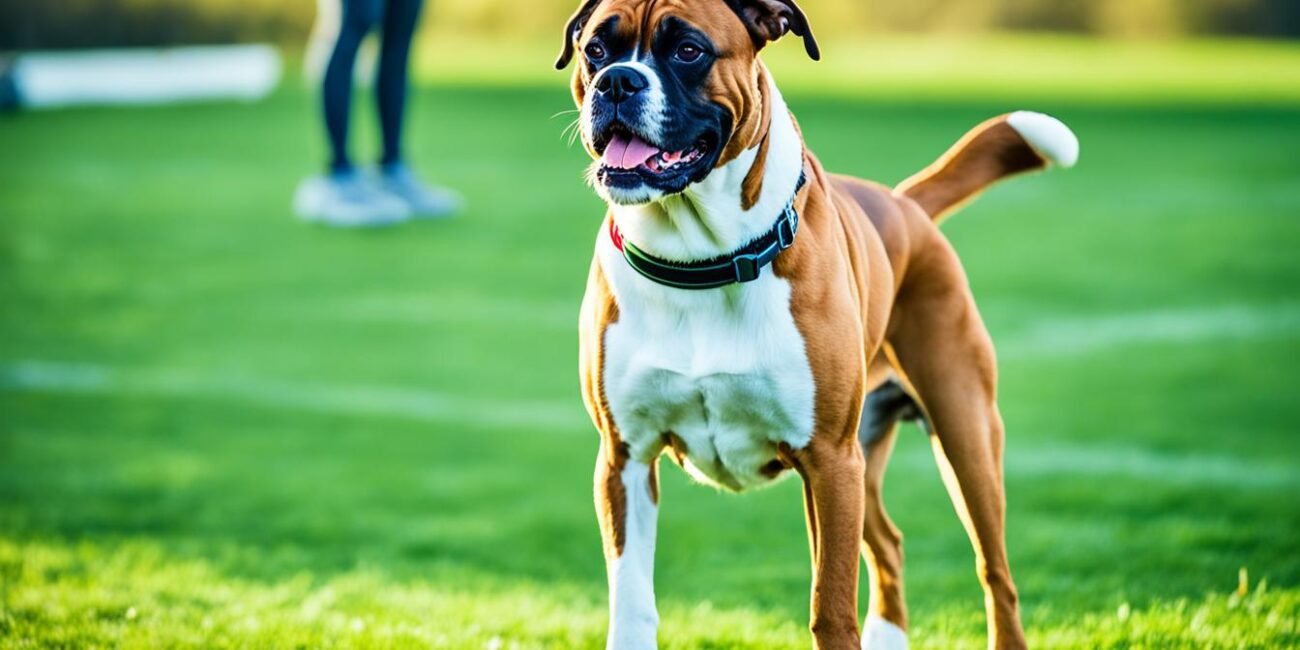


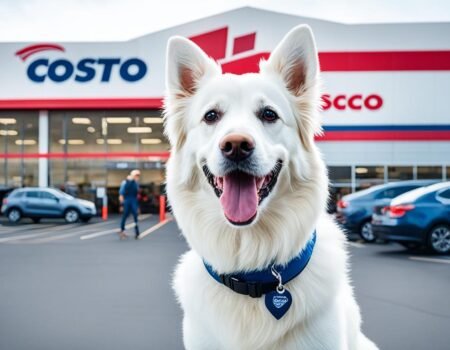
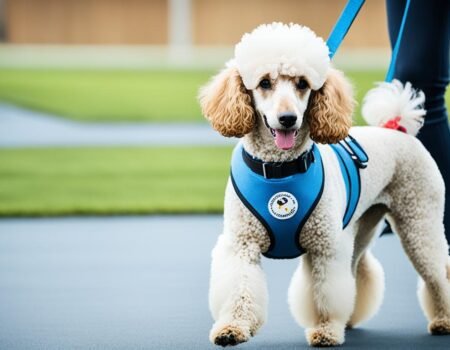
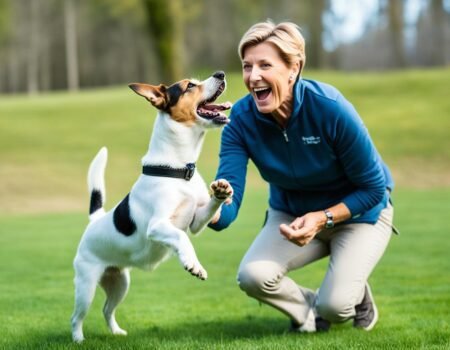
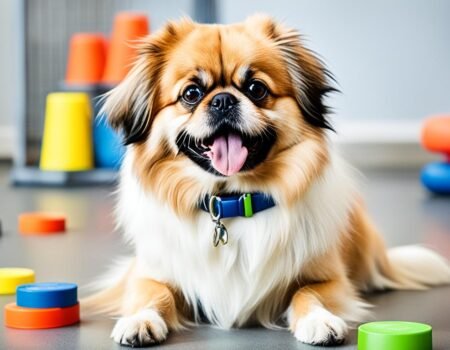
No Comment! Be the first one.